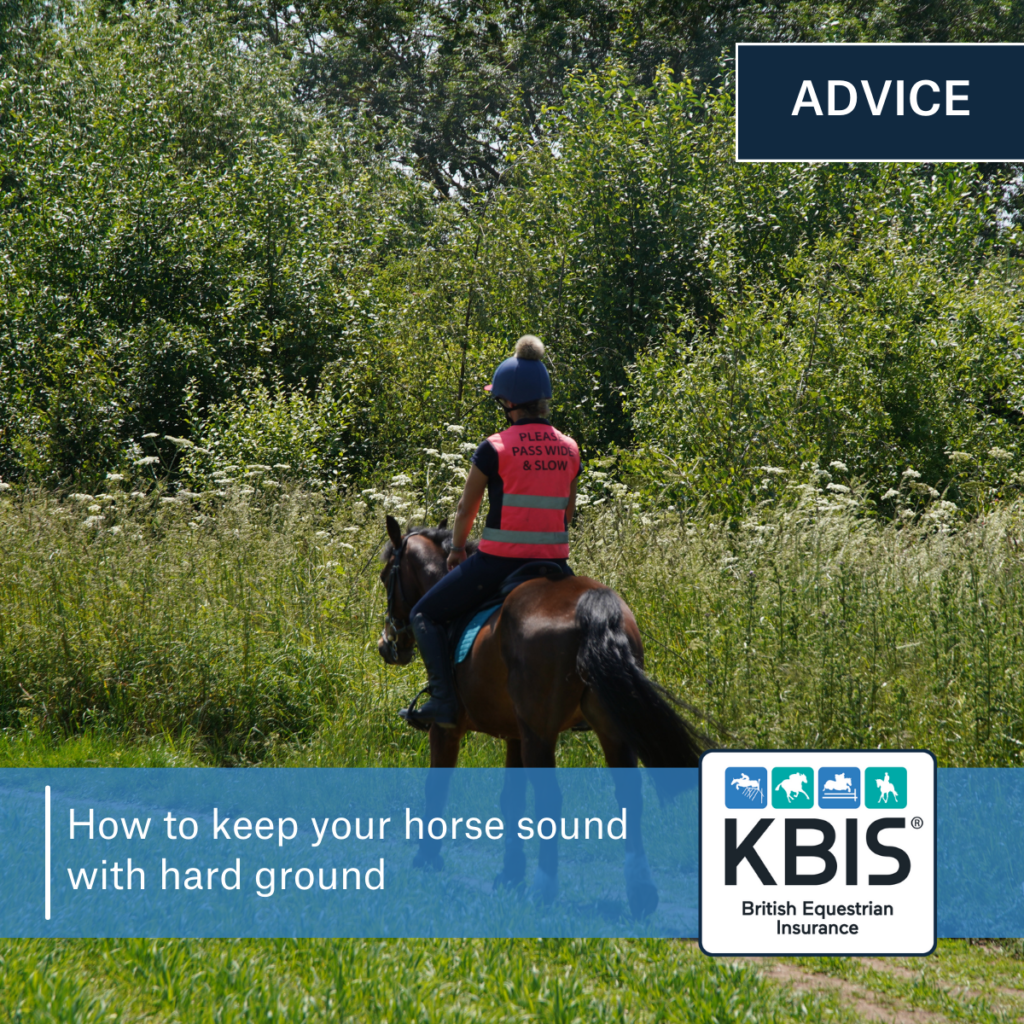As equestrians, we all dream of the day when the winter mud will be gone and the fields and bridleways are dried out, but the dry, hard ground can bring about its own problems. When a long period of dry weather occurs, hard surfaces can pose a risk to legs and feet and in serious cases, can lead to lameness and injury.
The dangers of hard ground
All horses will react differently to hard ground, their conformation will have a big part to play. For example, those with low heels and thin soles will be much more impacted by hard ground than those with more upright feet. Contrary to popular belief, horses cannot be conditioned to ride on hard ground and the concussion from regularly doing so can lead to bruised soles, splints, tendon injuries, sore shins and concussive laminitis.
How to keep your horse sound when the ground is hard
Whether you are experiencing a dry spell or are spending a lot of time hacking on the roads, here are our top tips for keeping your horse sound and happy when riding regularly on hard ground:
1. Ride on a variety of surfaces
Varying the surface you ride on will work wonders for keeping your horse fit and sound and can even reduce the risk of injury. Always exercise caution when riding on very deep or hard areas and if possible, avoid sudden changes from riding on very soft to extremely hard going. Roadwork does have its benefits as it can increase bone strength and is an even surface, but try to mix it up with working on an all-weather surface and grass if possible.
2. Exercise on a surface when the ground is very hard
If you’re experiencing a dry spell, if possible, make use of an arena and all-weather gallops. In the school, vary your routine to give your horse a mental and physical workout. Get creative with poles and use raised and canter ones, try gymnastic jumping exercises, have a go at some groundwork to get your horse thinking about something new and even introduce some lateral movements such as leg yielding. Remember, the school doesn’t have to be boring and it’s up to you to make it fun for your horse if other exercise options are limited.
3. Put your horse’s feet first
Riding on roads and very hard ground results in a force that’s around 20 times more than grass or surfaces. This is the same for both shod and unshod horses. When the ground is hard, the hooves cannot absorb the concussive force so it will travel back up through the feet and legs, and they will be unable to absorb the shock. If you are regularly riding on roads and hard ground, speak to your farrier and ask about your options and what they think will suit your horse best, whether it’s a different type of shoe or boots for barefoot equines.
4. Lock in hoof moisture
It may surprise you, but a lot of hoof treatments can lock moisture out and prevent it from reaching the hoof. Before you apply any oils or dressings, wet your horse’s hooves and this will help to keep in the moisture.
Remember, our brand partners Wychanger offer KBIS policyholder’s a 15% discount across their range of products which includes hoof care brands like Kevin Bacon and NAF. Find the discount code on your policyholder benefit card. Wychanger
5. Protect against flies and insects
When horses are very irritated by flies and insects, they may stamp or kick to indicate their annoyance and try to rid themselves of flies. Doing this consistently may result in injury, particularly if they are always stamping on hard ground. Make use of fly sprays or gels and turn your horse out in appropriate fly gear to keep them happy and bug-free.
6. Ride for the ground
One of the best things you can do is adjust your riding for the ground you are working on. Avoid trotting for too long on roads, experts suggest no more than five minutes of trotting on a hard surface per day, whereas walking is fine and doesn’t need to be limited. If you are out hacking, ride a little slower than you usually would. Utilise hills for walk and trot work which is excellent for strength and stamina. If you are jumping, don’t over-stud and jump much smaller, opting for those you can trot into and easily pop.
7. Remove boots straight away
If you use boots, remove these straight after riding to reduce the risk of overheating tendons. It is a good idea to ice limbs immediately, check and clean your horse’s legs and then return the ice. A cold hose works well too! Rapid cooling can significantly reduce the risk of injury post-exercise. When you are choosing boots, go for air-cooled, breathable, or very light ones and avoid bandages.
8. Feed a balanced diet
You will be surprised by how much feeding a balanced diet can help keep your horse sound and healthy. Ensure there are appropriate levels of vitamins and minerals included in your horse’s daily diet. Biotin, methionine, calcium, copper and zinc are all great at supporting hoof health.
Joint support supplements will also help to maintain healthy joints and cartilage and should ideally introduced before a problem is encountered. Supplements such as band partner Animalife’s Vetroflex Original are a great choice in helping your horse to stay strong and sound as it protects cartilage – a natural shock absorber – from deterioration by naturally stimulating the production of collagen and proteoglycan, two key components in cartilage. KBIS policyholders, check your policyholder benefit card to find out how you can save with Animalife.
That’s our guide on how to keep your horse sound with hard ground. Looking for more horse care tips and advice? Read our article on cool down next.

